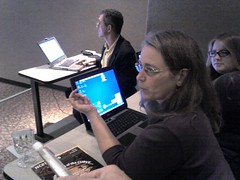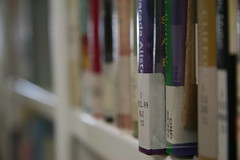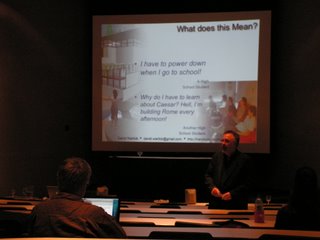We’ve had Project-Based Learning, and Problem-Based Learning. How about Passion-Based Learning? This is what’s suggested by former Palo Alto chief scientist, John Seely Brown, through a recent article (brought to my attention by the CoolCat Teacher, Vicki Davis) in ZDNet, To Fix Education, Think Web 2.0*. Check out the article in its entirety, but at the end, Brown concludes…
…Schools can teach essential knowledge and critical thinking through somewhat traditional means. But they should complement that teaching with what Seely Brown called “passion-based learning” that focuses on getting students more engaged with topic experts.
Futurist: To fix education, think Web 2.0 | Tech News on ZDNet
While reading this article, I got to thinking about how I grade myself. I rarely give tests or even ask for understanding. Quite frankly, I really don’t care that much about the right ways of doing things, the best-practices that are defined by rigorous scientific research — and it isn’t that I don’t believe that what research tells us is unimportant. It is important. I’m simply more interested in respecting the value of the teacher’s intuition, what they believe will work based on years of observation, practice, success and failure, and their knowledge of their students, their learning environment, their curriculum, and their continuing professional conversations.
I gave tests when I taught social studies and science. But I graded myself with an “A” when parents told me, during conference night, that their son or daughter came home almost every day, talking about what they learned in Mr. Warlick’s class. Passion-Based Learning.
When I was at the State Department of Public Instruction, we put together a program called VoteLine, where students, during an upcoming election, researched the presidential campaigns, identified issues that seemed to be important, weighted each issue, surveyed their neighborhoods and communities, and recorded everything in spreadsheets (Apple IIe and AppleWorks). They used algorithms in the spreadsheets to project election outcomes. I knew that the project was working when teachers said that students were learning state-identified social studies skills. I knew that it was a success, when teachers said that they had never watched their students walking out of class and standing at their lockers talking about what they had learned in social studies class. Passion-Based Learning
I grade myself today when I see that what I am teaching or suggesting to teachers resonates with their intuitive sense that it is important. When I see pens come up, and teachers start writing, I know that what I just said or demoed was successful.
It happened the other day, when I was presenting about video games in education. I suggested that the best thing we might do with video games is to figure out what it is about video games that makes them such a compelling learning engine, and try to integrate those elements into the classroom, rather than trying to integrate the games into the classroom. One of the elements that I suggested was identity building — that players typically develop an identity in their games. They choose and sometimes make their own clothing, their house, select the powers they value, and become a recognizable identity in the game. It’s how the games are designed and programmed. Might we program our classrooms to encourage identity building.
 I suggested that at the beginning of the school year, we present students with a list of topics, people, events, places, concepts, etc. and ask them to select one, as individuals or groups, that they want to study, and then require them to immediately set out to make themselves an expert.
I suggested that at the beginning of the school year, we present students with a list of topics, people, events, places, concepts, etc. and ask them to select one, as individuals or groups, that they want to study, and then require them to immediately set out to make themselves an expert.
In my social studies class, two students may have chosen the Declaration of Independence. Before we start exploring the new world, they are working on their study of the 1776 document. They start populating a class wiki, to become a growing class constructed dynamic and digital textbook. The start preparing a multimedia presentation to be delivered when the class finally reaches the latter half of the 18th century. An most importantly, they become the expert. As discussions of U.S. History continue, they are asked, from time to time, is this an issue that the Declaration of Independence will try to address? They have an identity, within the context of what and how the entire class is learning. Passion-Based Learning!
The pen rose, and teachers started writing. Bingo!
2¢ Worth!
* LaMonica, Martin. “Futurist: To Fix Education, Think Web 2.0.” Web Technology 1 Dec 2006 5 Dec 2006 <http://news.zdnet.com/2100-9588_22-6140175.html?tag=nl.e539>.
technorati tags:warlick, johnseelybrown, coolcatteacher, education, technology, videogames
Blogged with Flock
Seymour Papert, a professor emeritus at MIT who is one of the pioneers of artificial intelligence and an authority on how computers can help children learn, was seriously injured after being struck by a motorbike in Hanoi, where he was attending a conference.

 Richardson is right in making this distinction, though, to be fair, technology can go a long way in helping teachers do their jobs without
Richardson is right in making this distinction, though, to be fair, technology can go a long way in helping teachers do their jobs without  I suggested that at the beginning of the school year, we present students with a list of topics, people, events, places, concepts, etc. and ask them to select one, as individuals or groups, that they want to study, and then require them to immediately set out to make themselves an expert.
I suggested that at the beginning of the school year, we present students with a list of topics, people, events, places, concepts, etc. and ask them to select one, as individuals or groups, that they want to study, and then require them to immediately set out to make themselves an expert. Last week I conducted an EduBloggerCon at the NCETC conference. It was an
Last week I conducted an EduBloggerCon at the NCETC conference. It was an  This is a quick but potentially important question.
This is a quick but potentially important question.

